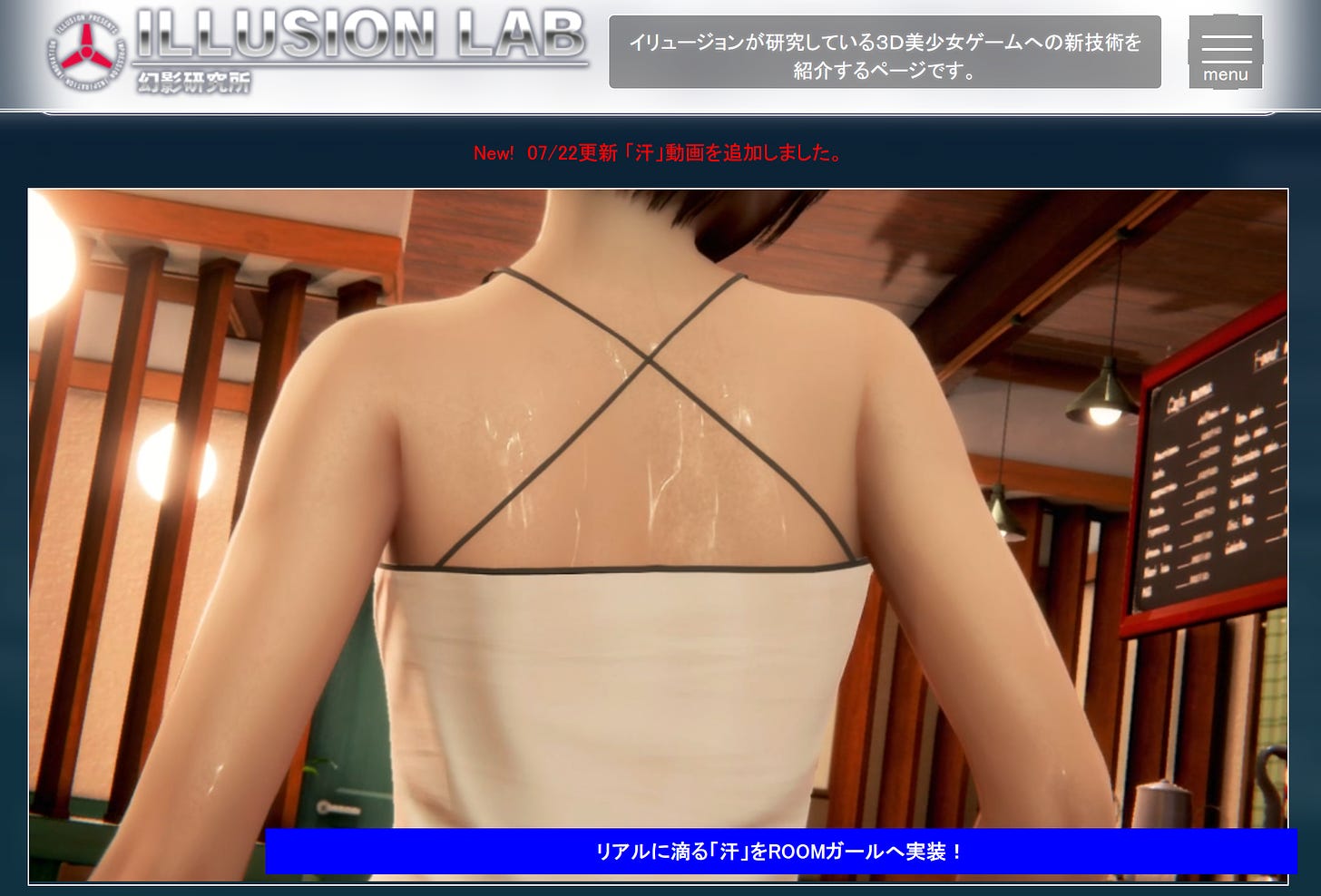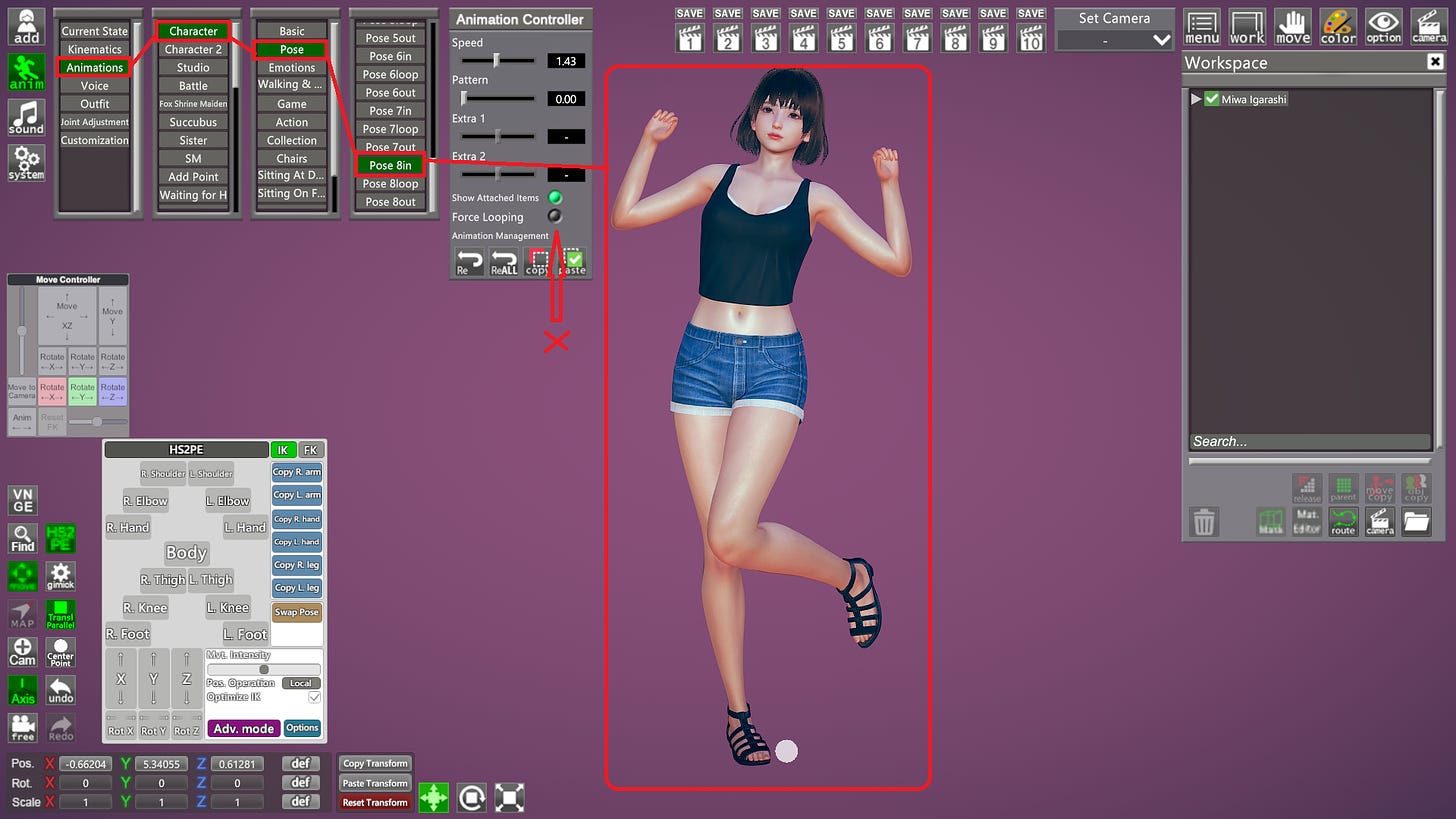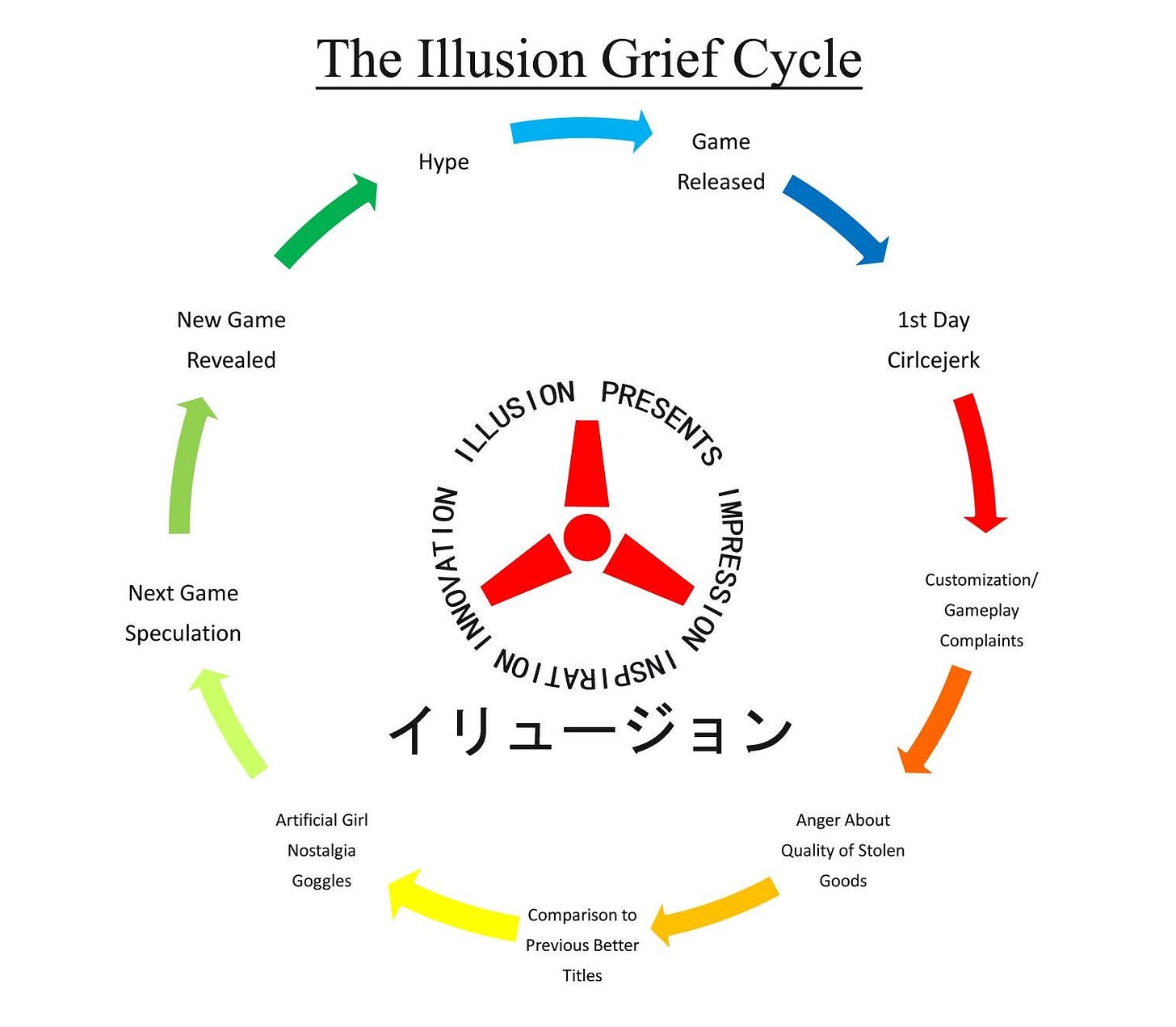How does Illusion keep the hype train running?
Pushing boob physics to the limit in Naughty List News #84
Illusion is a Japanese game maker that has been pushing the bar for what adult games can play like since its founding in 1993. Their games are well-known for their graphical fidelity and are always highly anticipated by the adult gaming community.
What’s remarkable is that the company has thrived for almost three decades through multiple significant shifts in the adult games market. Since Illusion is set to release Room Girl at the end of this month, I thought it might be prudent to take a closer look at what makes the company so successful.
Graphics are king
Illusion has long since realized that graphical fidelity is a big selling point for its games. While many of Illusion’s games try to do interesting things with their gameplay as well, that’s not really what the studio is known for.
The company has done a lot of research into breast physics, skin rendering, and real-time fluid simulations, which raise the bar for what a next-generation adult game can look like. Illusion’s engineers are happy to share their findings in updates on their blog, which the company uses as another way to generate interest for their games.
But even this extreme focus on graphics isn’t enough for some players, who go utterly hog-wild in modding the games to improve the lighting, texturing, and more. Every Illusion title has a dedicated fanbase that creates its own characters, adds new clothing, and (of course) removes the censoring from the sex animations.
And sure, Illusion’s graphics still don’t always look best-in-class, especially compared to contemporary AAA games. But their products still stand head over shoulders above their competition in the adult game space. That’s because most adult game makers that aim for realistic graphics do not also try to make those graphics render at a reasonable framerate.
Unfortunately, players will always demand more. They don’t just want realistic graphics but excellent gameplay as well. And historically, the only way Illusion has been able to keep its competitive advantage is by sticking to an aggressive release schedule.
Killer pace
Illusion likes to release games on a “tick-tock” schedule, where each “tick” game pushes the technical bar higher, and a “tock” game focuses on using that tech for gameplay features.
For example, Illusion used Real Girlfriend (2010) as a barely-disguised tech demo for SchoolMate 2 (2010), which it released just four months later. Real Girlfriend had only three characters to interact with, each with just one scenario. There isn’t much narrative either, just some basic set-dressing that doesn’t connect the stories of the three women.
SchoolMate 2 leveraged these graphical improvements and improved the gameplay significantly. It introduced an open-world setting via interconnected scenes, a mood system for the girls, and conversations that feed into the girls’ feelings for the player character.
But players still felt the gameplay experience of SchoolMate 2 was rather shallow. And this criticism tends to crop up with every “tock” game Illusion releases: Yes, the game looks great, but the gameplay isn’t deep enough to satisfy over longer periods of time.
Although Illusion has slowed down somewhat in recent years, they still release either an expansion or a whole new game every single year. This is crazy considering that the median AAA game is six years in development.
Still, the hype train never stops. Fans are as excited as ever for Room Girl, due to release next month. Especially because it promises to upgrade the Studio application that many adult game makers rely upon.
Community tools
All newer Illusion games come with a dedicated Studio application, an extremely advanced tool for posing and animating characters independently of the game. You can add any characters you’ve created in the main game to your own scenes and use them with all the same poses and animations. You can then modify your characters using both Forward Kinematics (FK) and Inverse Kinematics (IK), allowing completely free range of movement. The only limit is your imagination (and your patience.)
I strongly suspect that Illusion uses this application themselves to make their scenes. This is a practice known in the software world as, grotesquely enough, eating your own dog food. It would explain why the Studio application gets better with every new game release, even if it’s still a very clunky piece of software in practice.
Because the Studio tool uses the same rendering technology as the main game, many indie adult game makers use the application to create graphics for their games. It’s a cheap route for getting great-looking character renders, especially because you can reuse animations and poses between your characters.
Using Illusion’s assets in this way is technically copyright infringement, but to my knowledge, no game maker has ever gotten in trouble for it. However, if you want to stay on the safe side, you should use Studio only to create so-called “temp art,” which you put in your game with the understanding that it will be replaced by real art later.
Unmet expectations
Long-time fans of Illusion’s games are intimately familiar with what’s known as the “Illusion Grief Cycle.” Each game’s relative disappointment feeds into the hype cycle for the company’s next title:
I’ve played every Illusion game since Artificial Girl 2 in 2004 and have also gone back in their catalog to play their older titles. I know that long-time fan because he’s me. And even though I still can’t understand a lick of Japanese, that’s actually part of the appeal to me.
Every new Illusion game promises an improved experience, but it was always locked behind a mysterious interface. This makes the games appear much deeper and more mysterious to me than they really are. Of course, nowadays I don’t have to rely on dodgy fan patches anymore, and I can just buy Illusion games on Steam!
What’s your experience with Illusion games? Do you feel they live up to the hype or do you wish the company would actually focus on gameplay for once?
Writing Wrap-Up 📖
Strategy game How to Build a Magnificent Kingdom is out now on Steam. Princess Aridane, disturbed by her father’s recent massacre against his people, attempts to rebuild the kingdom with your help.
Dream Hacker is a puzzle game now available on Steam. A genius recluse invents a device that allows him to access the dreams of beautiful women and ultimately influence their desires.
Corruption-flavored visual novel My devil’s voice is out now. An ambitious demon is tasked with corrupting a whole town, but the forces of Heaven have sent down an angel to stop you in your tracks.
The Futanati is a mystery visual available now on Steam. A bored hacker uncovers a protocol for a New World Order and he soon finds himself at the mercy of the mysterious Futanati organization.
NookGaming reviewed Idol Manager. They recommend it for fans of management sims and idol culture alike.
California passed an age verification bill that websites will find impossible to comply with. Websites will have to verify the age of their users with “a reasonable level of certainty,” meaning face tracking, and would apply to any website “likely to be accessed by children.”
Cheeky chuckle 🤭



Artist spotlight 💡

Thanks for reading this far!
If you want to help me compile the newsletter, feel free to poke me on Twitter.
Until next time!
-Mr. Hands












